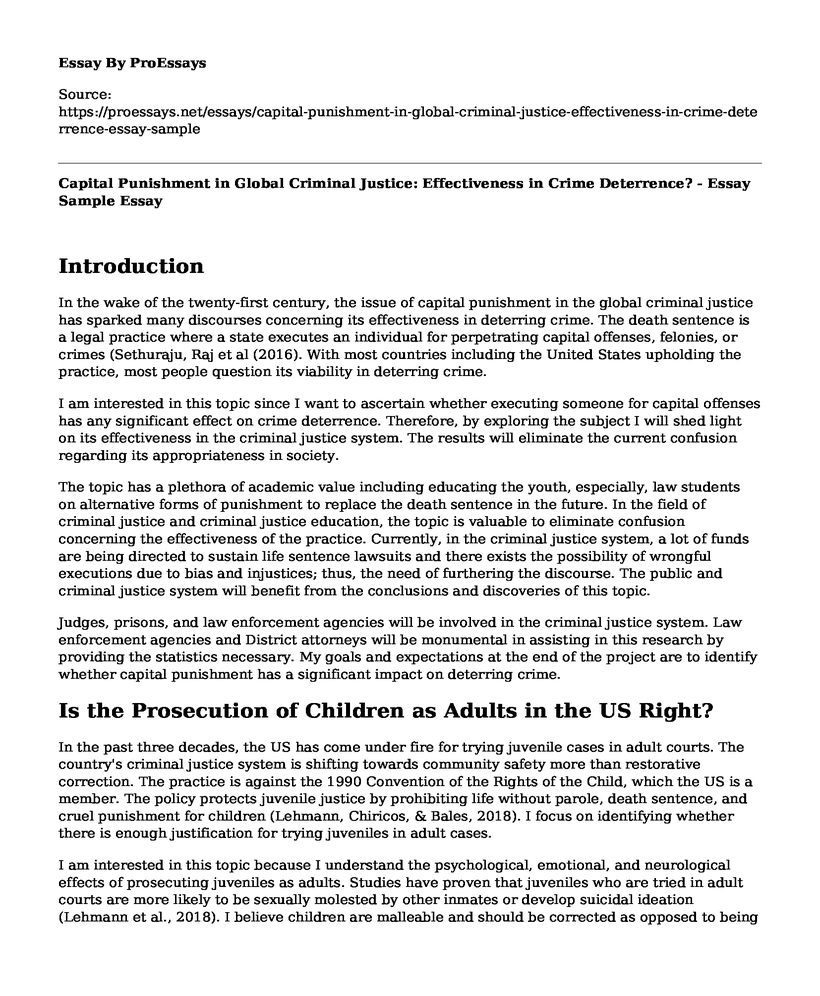Introduction
In the wake of the twenty-first century, the issue of capital punishment in the global criminal justice has sparked many discourses concerning its effectiveness in deterring crime. The death sentence is a legal practice where a state executes an individual for perpetrating capital offenses, felonies, or crimes (Sethuraju, Raj et al (2016). With most countries including the United States upholding the practice, most people question its viability in deterring crime.
I am interested in this topic since I want to ascertain whether executing someone for capital offenses has any significant effect on crime deterrence. Therefore, by exploring the subject I will shed light on its effectiveness in the criminal justice system. The results will eliminate the current confusion regarding its appropriateness in society.
The topic has a plethora of academic value including educating the youth, especially, law students on alternative forms of punishment to replace the death sentence in the future. In the field of criminal justice and criminal justice education, the topic is valuable to eliminate confusion concerning the effectiveness of the practice. Currently, in the criminal justice system, a lot of funds are being directed to sustain life sentence lawsuits and there exists the possibility of wrongful executions due to bias and injustices; thus, the need of furthering the discourse. The public and criminal justice system will benefit from the conclusions and discoveries of this topic.
Judges, prisons, and law enforcement agencies will be involved in the criminal justice system. Law enforcement agencies and District attorneys will be monumental in assisting in this research by providing the statistics necessary. My goals and expectations at the end of the project are to identify whether capital punishment has a significant impact on deterring crime.
Is the Prosecution of Children as Adults in the US Right?
In the past three decades, the US has come under fire for trying juvenile cases in adult courts. The country's criminal justice system is shifting towards community safety more than restorative correction. The practice is against the 1990 Convention of the Rights of the Child, which the US is a member. The policy protects juvenile justice by prohibiting life without parole, death sentence, and cruel punishment for children (Lehmann, Chiricos, & Bales, 2018). I focus on identifying whether there is enough justification for trying juveniles in adult cases.
I am interested in this topic because I understand the psychological, emotional, and neurological effects of prosecuting juveniles as adults. Studies have proven that juveniles who are tried in adult courts are more likely to be sexually molested by other inmates or develop suicidal ideation (Lehmann et al., 2018). I believe children are malleable and should be corrected as opposed to being punished as adults.
The study has academic value since it informs scholars and learners of the reasons why most states are adamant in upholding the practice. Currently, different states have outlined the minimum age of trial as an adult, while others do not have a law, leaving the prosecution of children at the discretion of juvenile court judges The public, children's rights groups, and juvenile courts will benefit from the conclusions of this project.
District attorneys and juvenile court judges will be involved in the discourse since they have pertinent information regarding why a minor can be prosecuted as an adult. They will provide existing legal advice on the matter. Additionally, they will advise on what can be done to prevent infringing children's rights.
My goals and expectations at the end of this project are to outline and understand the pros and cons of trying juveniles in adult courts. I intend to gain adequate legal and logical inferences as to why various practices in the criminal justice system concerning juveniles are considered. Ultimately, I aspire to change how the system deals with minors, which is often harsh.
References
Lehmann, P. S., Chiricos, T., & Bales, W. D. (2018). Juveniles on trial: Mode of conviction and the adult court sentencing of transferred juveniles. Crime & Delinquency, 64(5), 563-586. https://doi.org/10.1177/0011128717714203
Sethuraju, Raj et al (2016). Understanding death penalty support and opposition among criminal justice and law enforcement students. SAGE Open,6(1), pp. 1-15. DOI: 10.1177/2158244015624952
Cite this page
Capital Punishment in Global Criminal Justice: Effectiveness in Crime Deterrence? - Essay Sample. (2023, Aug 09). Retrieved from https://proessays.net/essays/capital-punishment-in-global-criminal-justice-effectiveness-in-crime-deterrence-essay-sample
If you are the original author of this essay and no longer wish to have it published on the ProEssays website, please click below to request its removal:
- Medical and Insurance Options Essay
- HITECH Act Essay Example
- The State of Confusion v. William K Defendant Case Study
- Community Armed Self-Defense Essay Example
- The US Constitution V. Texas Constitution Essay Example
- Baltimore: Poverty, Drug Markets, & CCP to Restore Good - Essay Sample
- Essay Example on Smart Home Security: Protecting Privacy From Hackers and Cybercriminals







